Strewn above Queensland’s Cape York Peninsula, the Torres Strait archipelago offers a rare blend of First Nations cultures along with turquoise waters and postcard-pretty beaches. Kendall Hill shares his experience.
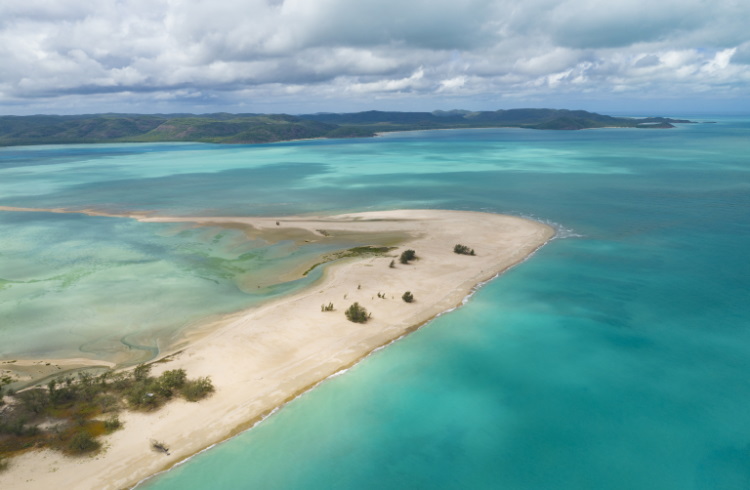 Photo © Tourism Tropical North Queensland
Photo © Tourism Tropical North Queensland
The 200-plus islands of the Torres Strait archipelago, strewn across the Coral and Arafura seas from Cape York to New Guinea, are the last, dazzling gasps of the Australian continent. Rich in history and home to culturally diverse communities dominated by two First Nations peoples and descendants of pearling workers from across Asia and the Pacific, these treasure islands are like nowhere else on Earth.
- Touring made easy
- Traditional Torres Island culture
- The Mabo case: a return to native ownership
- Exploring the islands from the air
- Take to the waters (and the streets)
- Soaking up the island vibe
- Exploring further afield
- Trip notes
Touring made easy
Newly launched tour operator Strait Experience packages island experiences together for the first time, making visits to the Torres Strait more rewarding than ever and bringing new support to local businesses. “Locals complained that no one can find us,” explains co-founder John Palmer. “We’re just creating a platform for people to launch their dreams,” says business partner Fraser Nai. “To give people meaningful purpose so they can have pride and ownership of what they do.”
Strait Experience offers day and multi-day tours leaving from Cairns that explore the cultures of Ngurupai/Horn and Waiben/Thursday islands and beyond. Equal parts history, food, customs and adventure, the highlight of all its tours are the people themselves, especially the rare combination of Australia’s two First Nations people, the Kaurareg Aboriginals and the Torres Strait Islanders. This is the only place on the continent where visitors can experience the distinct culture and lore of both.
Traditional Torres Island culture
Islander stories are passed down through dance. Visitors can tap into that tradition at Island Stars, artist and educator Joey Laifoo’s new cultural hub on central Thursday Island. Here, on a sand stage behind a gallery showcasing Laifoo’s art, performers dressed in grass skirts and headdresses use dance, drums, and song to tell stories of islander life; how they use the stars and winds to navigate and to know when’s the best time to hunt various marine creatures.
“We started this to educate children about our culture, but also to give our kids the chance to perform and tell their stories,” Laifoo says. Performances end with a communal feast of customary dishes include namas (a cured fish salad), chicken curry, and sop sop yam stew.
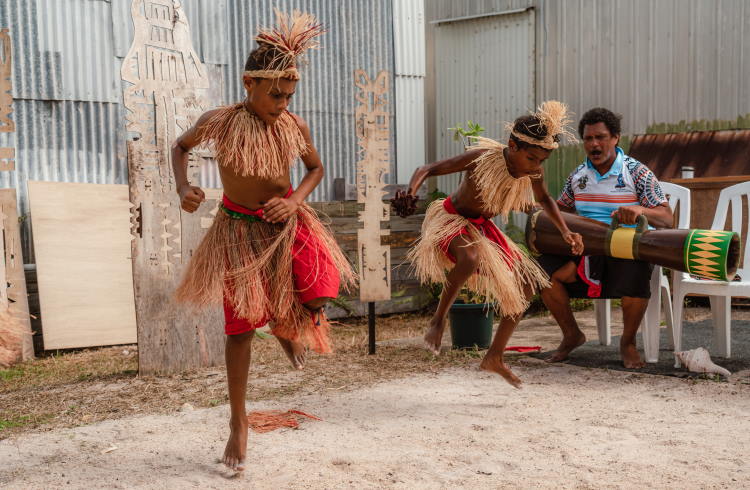
The Mabo case: a return to native ownership
2022 marked the 30th anniversary of the landmark Mabo case which established land rights for those Australians who lived here for tens of thousands of years before the British. The Gab Titui Cultural Centre on Thursday Island recounts the story of how Eddie Mabo, a trade unionist from the tiny island of Mer, led the fight to reclaim native ownership of the islands.
It’s a moving history that reminds me of the sense of national pride in 1992 when the High Court ruled to reverse centuries of injustice. Elsewhere in the gallery you’ll find traditional art including totem-like ceramic posts from Erub Island depicting reefs, sand cays, and the sea, and ceremonial dhari headdresses fashioned from cane, feathers, and twine.
Exploring the islands from the air
The best way to appreciate the beauty and reach of the islands, to get a sense of where you are and how land and sea interconnects, is to take to the skies. Nautilus Aviation offers scenic flights tracing the region’s pearling and wartime history with bonus flyover of the northernmost point of the Australian mainland. En route you’ll discover dreamy-looking beaches (mind the crocs), mountains and waterfalls, and the odd shipwreck. Look out for migrating humpbacks between July and September.
Take to the waters (and the streets)
Laidback local Dirk Laifoo (Joey’s uncle) operates taxi tours around Thursday and tinnie tours to neighboring islands. In his maxicab, we visit the Japanese Pearl Divers’ Cemetery, Green Hill fort – the views are excellent – and the compact downtown.
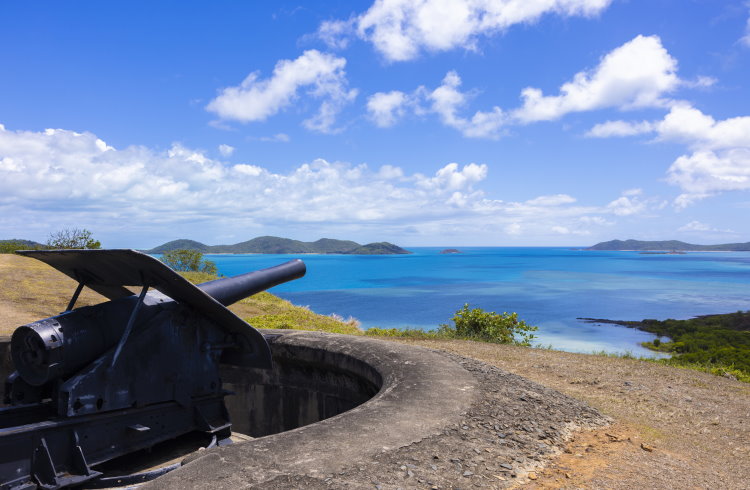
Afterwards he has me wait at the pier while he fetches his simple ‘tinny’ (aluminium boat). We set off for leisurely cruise along the coastline of neighboring Prince Wales/Muralug, a brochure-perfect beach on the tip of Friday Island, past lighthouses and lookouts and Basket Island, a manmade installation of discarded pearl frames.
Green turtles make cameo appearances at the water’s surface but dugongs are, true to their nature, elusive. They have very good hearing, Laifoo explains, “so if they hear the outboard they tend to take off.”
Soaking up the island vibe
Island dining is best described as pub culture, with Australia’s northernmost pub, the Torres Hotel, serving classic counter meals and tap beers at breezy balcony tables. The closest thing to a social hub on Thursday is Makai Café on seafront Victoria Parade, which does a roaring morning trade among government workers, police, tradespeople and tourists. The (organic, free-trade) coffee is the best on the island; pastries and rolls available too.
A short amble away is the ferry shelter where locals gather to swap news and wait for island transfers. Shelter conversations are a highlight of any TI visit; the locals are genuinely friendly and curious about outsiders. Beaches are plentiful and postcard-pretty. But be wary if swimming. Guidelines issued by the regional council suggest: “It’s not a good time to swim during these times: jellyfish season, when turtles are being cut up on the beach (sharks), morning, midday, evening.” (So essentially, never.)
Exploring further afield
Horn and Thursday are easily accessible, but Strait Experience can organize visits to most of the archipelago’s inhabited islands, including Nai’s home island of Masig/Yorke. “It’s beautiful, man. It’s all atolls, like the Maldives.” He shows me photos on his phone; it’s a classic desert-island paradise of blinding white sand, palm trees, and transparent blue seas. Closer to New Guinea, the mangrove community of Boigu is the most northerly inhabited island of Australia. Every island has a distinct way of life; no two are the same.
Trip notes
When to go
Tourist season starts when the wet season ends (traditionally around Easter) and Cape York roads reopen. It was still raining on and off in June when I visited. This is not a deterrent – the rain’s refreshing – but might affect what’s available (tours tend to be cancelled if it’s wet).
Getting there
Strait Experience offers several TSI tours including one-day packages ex-Cairns that include a scenic helicopter flight, tours of Ngurapai (Horn Island) and Waiben (Thursday Island), banquet lunch and cultural performance. Independent visitors must seek permission to enter from the Torres Strait Island Regional Council.
Kendall Hill traveled as a guest of Strait Experience and Tourism Tropical North Queensland.
Related articles
Simple and flexible travel insurance
You can buy at home or while traveling, and claim online from anywhere in the world. With 150+ adventure activities covered and 24/7 emergency assistance.
Get a quote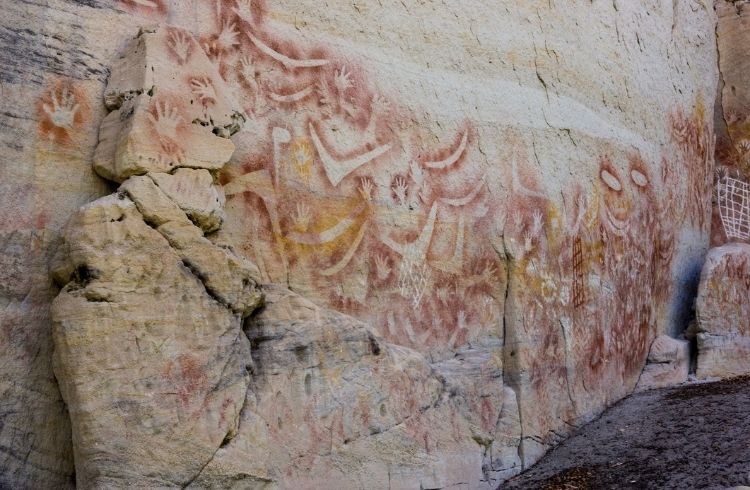
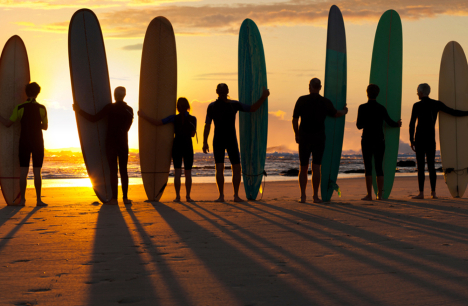
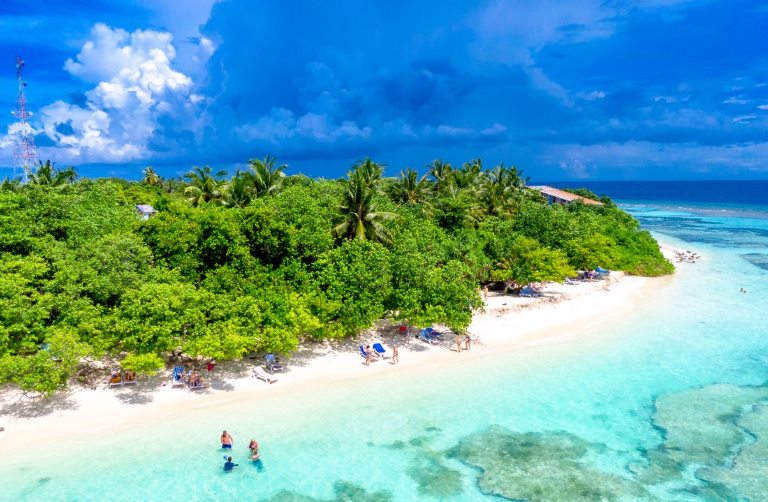
1 Comment
Hello to the person who asked us to change Aborigine to Aboriginals - thank you for the correction. Your comment was deleted by mistake - sorry about that. Please feel free to repost.
Best,
World Nomads